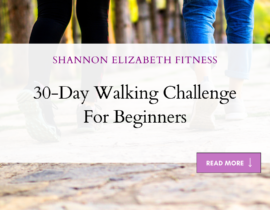Over the course of a year, I started running (again after an
Oddly or not, I still consider myself to be a new runner. Because I’ve only been running for a year and a half I still feel like there is so much to learn about running. Who would have ever thought there would be so much to know about something so seemingly simple? When I first started running, I thought I would just slap on some shoes and I would be off! But it turns out a little bit more goes into having a successful run.
This post contains affiliate links #ads. See Disclosure for details. Opinions are my own.

Why is it important to be prepared?
Many people dislike the idea of running. Which I totally get! But truthfully, running can be a fun and enjoyable form of exercise if you prepare yourself properly. So why is preparing yourself properly for a run important? The number one reason is to avoid injury. Running injuries can happen so quickly and easily, and once they occur it takes a long time to get back on the road.
If you’re a complete beginner, meaning you haven’t been out for your first run yet, check out this post first. Otherwise onto my hacks for beginner runners!
12 Hacks All Beginner Runners Should Know:
Get a proper pair of running shoes.
Many beginner runners underestimate the importance of a good pair of running shoes. It’s a good idea to go to a running specialty store to get outfitted with your first pair of shoes. Everyone’s feet are different and a specialty store can help you find the perfect shoe for your foot to ensure you have a comfortable run. When in the store, walk around in the shoes for a tiny bit to get a feel for the shoe. If the shoes feel even slightly uncomfortable don’t buy them. Take the time to find the right shoe for you.
Have a running planner.
A running planner is great for setting running goals and keeping yourself on track for improvement. If you’re a beginner runner who wants to start running small races then a planner will help get you from couch to finish line. I personally recommend this great running planner from 366 Days of Running (affiliate link). I’m currently using it to start training for some spring 2020 races.
Rotate your running shoes.
Rotating your running shoes is a great way to help prevent injury. Wearing a more cushioned shoe for long runs and then a light-weight, minimalist shoe for short runs can reduce your risk of injury by nearly 40% according to recent studies. This is because changing your shoes changes the way your foot strikes the ground and absorbs the impact. It also changes the load distribution throughout the lower body which strengthens different muscles, again, helping to prevent injury.
Track shoe mileage.
Start tracking your shoe mileage from the very first run. A typical pair of running shoes will last between 300-500 miles. Keep in mind a really high-quality pair of running shoes will last much longer. However, typically after 500 miles, it’s time to swap out your running shoes for a fresh pair. This will help prevent injury and keep you comfortable on your runs.
Build up endurance with a walk/run technique.
One of the quickest ways to get an injury is to go too hard too soon. You can build up endurance slowly by using a walk/run technique. This method involves running for a set time (beginner runners usually run for 2-3 minutes) and then taking a planned walk (usually 1-2 minutes). This reduces stress on both the body and the mind. This running technique is great for practicing proper breathing, eating, and drinking while running.
Try a program like Nike+Run App.
One of the best decisions I made when I started running and training for my first race was to follow a running program. A running program is helpful because it ensures the runner doesn’t do too much too soon. It also helps to gradually increase mileage and work on pace. There are so many running programs out there, and many of them are free to use. I personally used the Nike+ Run Club app for the auditory running programs. I liked having the program in my ear while running for a few reasons:
- Helped keep the focus on the technical parts of the run.
- It was very motivating.
- It kept attention away from the length of the run.
Start on a treadmill.
I know some people might disagree with me on this point and that is fine, but I highly recommend starting on a treadmill before hitting the road. The main reason being the treadmill puts way less stress on your bones and joints. Running on the treadmill allows you to build up some muscle to support these joints before running on the more challenging road. A treadmill also provides more flexibility during the run in that you can slow yourself down or speed up when necessary. And the best part, you can stop when you’re tired.
Running outside always means running out and then back again. And, for the most part, you always have to run back to where you started. Fatigue or injury can make for a very long walk. So I recommend starting on a treadmill and taking to the road when you have a little more muscle and endurance.
Practice proper hydration while running.
Staying properly hydrated during a run isn’t quite as easy as it sounds. The key is to not over or under-hydrate. First, you want to drink lots of water in the two hours before your run to hydrate your body. Try to drink at least 16oz. Before you start your run, top yourself up with another 4 oz. If you plan on running for more than 30 minutes, you will need to hydrate while running. If there are no water stops along your route, carry your water with you. You can use a water belt, hydration vest or simply carry a bottle in your hand should you choose. If you are running for more than a half-hour try to drink water roughly every 20 minutes. And don’t worry, you won’t get a side stitch!
Strength train.
Beginner runners should be strength training roughly twice a week. Strength training at least twice a week will hugely improve your running. This is because you are building up different muscles in the legs, glutes, and abs, all of which will make you a better runner. What are the best strength training exercises for runners?
- Squats – wide and narrow
- Planks
- Bent over rows
- Forward lunge with overhead press
- Single leg bridge
- Backward lunge with bicep curl
Avoid chaffing.
Chaffing makes running incredibly uncomfortable. The best thing is to be prepared before you run to make sure it simply doesn’t occur. I like using products like Body Glide to help prevent chaffing. Plus it’s made with 100% natural ingredients!
Stretch after your run.
Most people remember to do a stretch and warm-up before a run, but many people forget that stretching after a run is just as important. Stretching after running significantly helps to reduce injury. Not only that, but it will also help to reduce soreness or any cramping. Stretching after your workout allows you to use your muscles in a greater range of motion. This will increase your overall performance over time. Here are some great post-run stretches:
Forget about pace.
Pace seems to be the number one thing most runners care about. And I too got sucked into the “pace race” for a while. But honestly, that made me miserable. I was constantly comparing my pace to that of others, and with social media, that is an incredibly easy thing to do. Being concerned with pace can suck the joy from running. And comparing yourself and your run to that of others can lead to quitting altogether. Remember, never compare your beginning to someone else’s middle or end.
Unclench your body.
Lastly, remember to relax! It is important to pay attention to your body as you run. If you feel your shoulders start to creep up to your ears or your jaw starts to clench, it’s time to loosen up. If your shoulders start to move toward your ears, relax your fingers and shake your hands for a few seconds to release the tension from your arms. Drop your shoulders and allow your arms to swing gently with your stride. If you find that you are clenching your jaw throughout your run, soften your eyes and allow your jaw to slacken. You can also yawn, or pause and take a long slow breath.
Looking for more running tips? Check out my tips for running a half-marathon!
- Starting A NEW Fitness Journey At Nearly 40 Years Old! - 06/09/2024
- 30-Day Walking Challenge For Beginners - 12/05/2024
- 3 Simple Things That Healthy People Who DON’T Diet Do Differently - 10/05/2024




